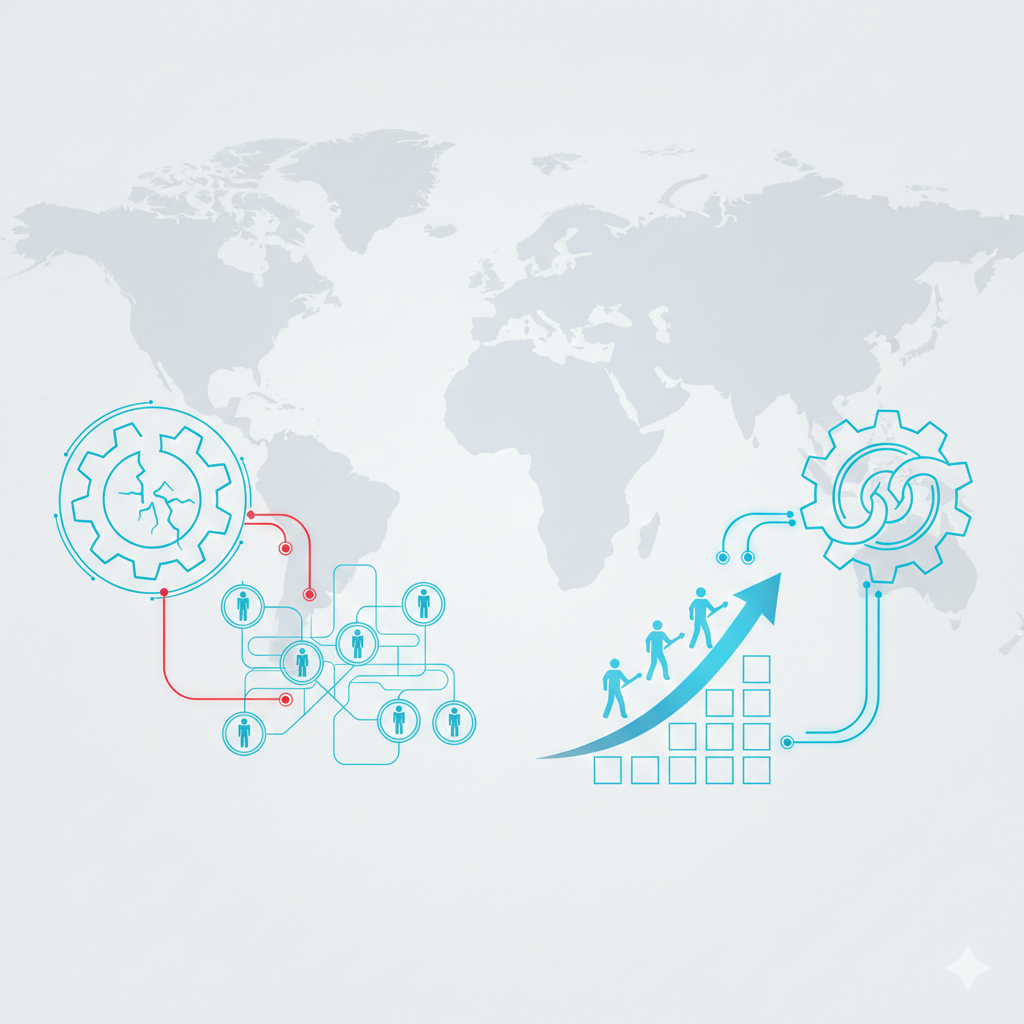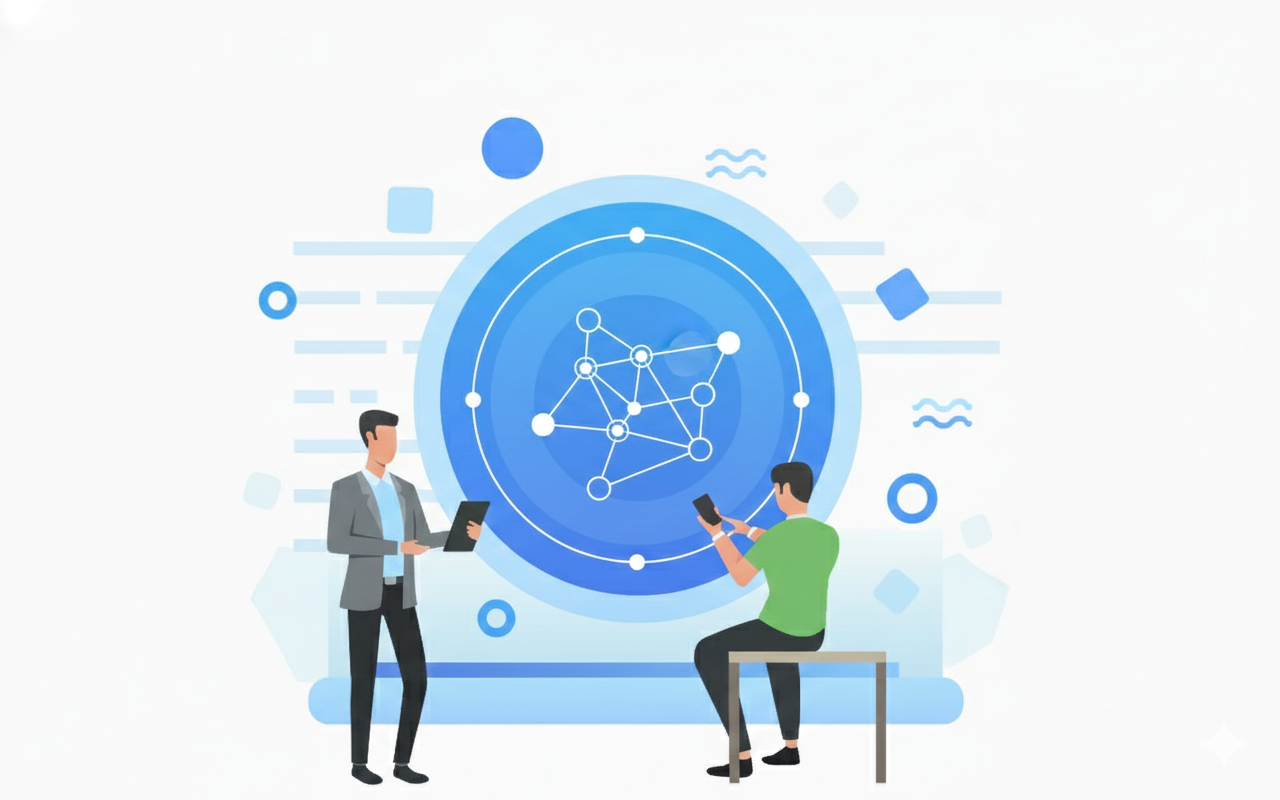

AI recruitment automation reduces time-to-hire by 75% in 2025 by streamlining candidate screening, engagement, and scheduling through intelligent, automated workflows.
Adopting AI recruitment automation in 2025 sets the new standard for efficient, fair, and data-driven hiring, empowering enterprises to achieve rapid, high-quality talent acquisition at scale.
For organisations handling thousands of applications per role, the initial screen has traditionally been a major bottleneck. AI-driven pre-screening now transforms this stage, instantly filtering applicant pools and surfacing top candidates based on role-specific requirements. Instead of weeks of manual CV sorting, recruiters can access a prioritised shortlist within minutes. By leveraging advanced algorithms, platforms like impress.ai eliminate repetitive, subjective screening ensuring only the most qualified candidates progress while freeing up recruiter capacity for higher-value engagement. This automation is especially vital for enterprises and government bodies where recruitment volume and compliance demand speed, accuracy, and documentation.
Beyond speed, intelligent pre-screening delivers consistency and objectivity. AI platforms process both structured data (like education and work history) and unstructured inputs (such as cover letters), applying role-specific benchmarks to every application. This ensures that the same standards are applied across all candidates, reducing human error and subjective judgements. As a result, hiring teams can trust that shortlists are built on merit and data, not intuition, establishing a foundation for fair and scalable hiring at any volume.
Manual CV review is not only labour-intensive but also prone to inconsistency. AI pre-screening replaces hours or even days of manual effort by scanning thousands of applications within minutes. Advanced algorithms parse both structured and unstructured data, rapidly matching candidate skills, experience, and qualifications to role-specific criteria. Recruiters are presented with a ranked list of applicants, allowing them to focus immediately on the strongest prospects. This shift from manual review to intelligent automation is enabling large organisations to manage high application volumes without expanding their recruitment teams, while ensuring no promising candidate slips through the cracks.
The ability to instantly identify top talent also reduces the risk of losing strong candidates to competitors, as the best applicants are contacted first. Automated CV review creates a smoother, more responsive experience for both recruiters and candidates, setting a new standard for efficiency in high-volume recruitment environments.
One of the most significant advantages of AI-based pre-screening is its capacity to reduce unconscious bias in the hiring process. By converting personal information such as names, ages, and demographic data into non-identifiable formats, these platforms ensure that shortlisting decisions are based solely on relevant qualifications and experience. This approach not only accelerates the process but also promotes diversity and inclusion, as every candidate is evaluated on a level playing field.
For organisations with strict compliance requirements, such as government agencies and regulated industries, objective shortlisting is critical. AI-driven systems provide transparent audit trails and documented evaluation criteria, supporting both fairness and regulatory standards. The result is a faster, more equitable recruitment process that delivers measurable improvements in workforce diversity and hiring quality.
Conversational AI has rapidly become a cornerstone of modern recruitment automation. By leveraging natural language processing, these platforms engage candidates through intuitive chatbots available 24/7 to answer questions, provide feedback, and guide applicants through structured assessments. This always-on capability means recruitment teams can efficiently manage surges in application volume, while candidates receive immediate, interactive support throughout their journey. Platforms like impress.ai have shown that embedding conversational AI can reduce candidate drop-off rates by up to 40%, ensuring talent pipelines remain robust and engaged.
Beyond engagement, conversational AI is instrumental in conducting competency-based assessments at scale. These structured interactions ensure all candidates are measured against the same criteria, producing consistent, data-driven evaluations. Self-learning FAQ engines further enhance the experience by resolving over 90% of candidate queries automatically, freeing recruiters to focus on strategic activities. The combination of engagement, assessment, and support positions conversational AI as an essential driver of recruitment efficiency and candidate satisfaction in 2025.
Candidates expect prompt, personalised interaction from employers and conversational AI delivers just that. AI chatbots respond instantly to candidate queries, guiding applicants through each step of the process and providing timely feedback. This real-time support maintains candidate engagement, answers frequently asked questions, and reduces uncertainty or confusion. By keeping lines of communication open around the clock, platforms like impress.ai ensure candidates remain actively involved, contributing to a significant reduction in drop-off rates and a more positive employer brand.
Immediate interaction also means candidates are never left waiting for updates or clarification, which is particularly valuable in competitive talent markets. The ability to deliver consistent, responsive communication at scale has become a defining feature of top-performing recruitment automation platforms.
AI-driven interviews use competency-based frameworks to assess every applicant consistently and objectively. These structured interactions are designed to evaluate candidates against predetermined criteria such as skills, experience, and cultural fit without the variability inherent in human-led interviews. By automating the initial interview stage, recruiters benefit from faster, standardised evaluations, ensuring that only the most suitable candidates move forward in the process.
This approach not only accelerates decision-making but also enhances fairness, as every candidate is measured by the same yardstick. For high-volume or decentralised recruitment environments, automated structured interviewing is essential for maintaining quality and compliance across multiple roles and locations.
Advanced FAQ engines are revolutionising how candidate queries are handled. These self-learning systems automatically resolve over 90% of questions, from application logistics to role specifics, without recruiter intervention. By continuously learning from new queries, the FAQ engine becomes more effective over time, ensuring that candidates receive accurate, up-to-date information instantly.
This level of automation not only improves the candidate experience but also allows recruiters to focus on complex or high-priority cases. The result is a streamlined process where applicants feel supported and informed, further enhancing engagement and trust in the employer’s recruitment journey.
Resume scoring and ranking, powered by AI, take candidate evaluation to the next level. Rather than relying on subjective judgements or keyword matching, algorithms assign scores based on skills, experience, and qualifications tailored to each role. This data-driven approach produces ranked shortlists that highlight the most promising candidates, enabling recruiters to make faster, more accurate decisions. For organisations with large applicant pools, automated scoring transforms selection from a manual guessing game into a precise, evidence-based process.
Configurable dashboards provide real-time visibility into candidate rankings, allowing recruiters to quickly review and compare applicants. By eliminating guesswork and standardising evaluation, AI-powered scoring not only speeds up hiring but also ensures every candidate is assessed fairly and transparently. This capability is particularly valuable for enterprises and public sector organisations where accountability and documentation are paramount.
Modern recruitment platforms use sophisticated algorithms to evaluate candidates against role-specific benchmarks. Skills, experience, education, and key qualifications are weighted according to organisational needs, with scores assigned automatically for each applicant. Visual dashboards present these scores clearly, highlighting the strongest matches and making it easy for recruiters to focus their attention where it matters most.
This data-driven evaluation reduces bias and subjectivity, ensuring that selection decisions are grounded in objective evidence. For organisations seeking to improve both speed and quality of hire, automated candidate scoring is now a critical component of best-practice recruitment strategy.
Recruiters are not limited to one-size-fits-all evaluation criteria. AI-powered platforms like impress.ai allow users to customise scoring metrics and weighting according to the specific requirements of each role. This flexibility ensures that shortlisting aligns closely with organisational objectives and job priorities, rather than generic standards.
Transparent scoring also supports compliance and stakeholder confidence, as recruiters can demonstrate exactly how decisions are made. By providing clear, adjustable metrics, automated resume scoring empowers hiring teams to adapt quickly to changing needs while maintaining fairness and accountability throughout the process.
Interview scheduling has long been a source of frustration and delay in recruitment. AI-powered scheduling tools now remove this bottleneck entirely by automating the coordination of candidate and interviewer availability. Once candidates pass initial screening, the system sends calendar invites, suggests optimal time slots, and enables applicants to book their preferred times all within a personalised dashboard. This automation not only shortens the time between screening and interview but also improves the candidate experience, reducing the risk of losing top talent to scheduling conflicts or slow communication.
By integrating with recruiters’ and hiring managers’ calendars, AI-driven scheduling ensures that availability is always up to date, minimising double bookings and administrative overhead. Organisations adopting automated scheduling are seeing significant reductions in time-to-interview and improved conversion rates from application to hire, making it an essential tool in the modern recruitment toolkit.
Empowering candidates to choose their own interview times via self-service dashboards has become a game-changer for recruitment efficiency. This approach eliminates the need for endless email exchanges and phone calls, allowing applicants to select slots that suit their schedules. For recruiters, it means interviews can be arranged within hours rather than days, dramatically accelerating the process.
The convenience of self-service scheduling also enhances the candidate experience, demonstrating a commitment to flexibility and respect for applicants’ time. In competitive hiring markets, this can be a decisive factor in securing top talent.
Seamless integration with organisational calendars ensures that interview scheduling is both efficient and reliable. AI-driven systems automatically sync with recruiters’ and hiring managers’ schedules, suggesting only available slots and preventing conflicts. This real-time integration keeps all stakeholders aligned and reduces administrative workload.
For organisations with multiple interviewers or complex panel arrangements, integrated calendar management is particularly valuable. It supports efficient coordination, reduces the risk of last-minute changes, and ensures that the recruitment process runs smoothly from start to finish.
Delays and confusion during scheduling are common reasons for candidate drop-off. By streamlining this process with automated tools, organisations can keep applicants engaged and committed through to the interview stage. Prompt scheduling signals to candidates that the employer values their time and is serious about progressing quickly.
This efficiency not only reduces drop-off but also improves employer branding, as candidates are more likely to recommend and reapply to companies that offer a smooth, responsive recruitment experience. In turn, this helps organisations build stronger talent pipelines for the future.
Modern AI recruitment solutions are designed to work in harmony with existing HR technology stacks, integrating seamlessly with applicant tracking systems (ATS), assessment providers, and onboarding platforms. This centralisation eliminates data silos and manual data entry, ensuring that candidate information, assessments, and communications flow automatically across all systems. For large organisations with complex recruitment needs, integrated workflows are essential for maintaining speed, accuracy, and compliance at scale.
By connecting every stage of the hiring process from job posting to onboarding AI platforms like impress.ai reduce administrative burden, enhance data integrity, and provide a single source of truth for recruitment analytics. Integration also supports regulatory requirements, as audit trails and documentation are maintained automatically. The result is a faster, more reliable hiring lifecycle that adapts to the unique needs of every organisation.
Integration ensures that all candidate information, assessments, and communication logs are automatically synced across platforms. This unified data flow eliminates the need for duplicate entries and manual updates, reducing the risk of errors and saving valuable recruiter time.
With all recruitment activity captured in one place, hiring teams gain full visibility over every stage of the process, enabling more informed decisions and better collaboration. For organisations managing multiple roles or global operations, unified workflows are key to delivering consistent, high-quality hiring outcomes.
Once a hiring decision is made, integrated recruitment platforms transfer new hires’ data directly to HR information systems (HRIS) and onboarding tools. This seamless handover supports faster start dates, reduces paperwork, and ensures compliance with data privacy and regulatory standards.
Automated onboarding also improves the new hire experience, as candidates receive timely updates and clear instructions for their next steps. For HR teams, integration means less time spent on administrative tasks and more time focused on strategic workforce planning and development.
AI recruitment automation has become an essential asset for organisations determined to reduce time-to-hire by 75% without compromising on quality or fairness. Through intelligent pre-screening, dynamic candidate engagement, automated scoring, and seamless integration, platforms like impress.ai are empowering HR teams to meet hiring targets at scale. For enterprises, government agencies, and any organisation facing rising application volumes and complex requirements, adopting automation is no longer optional it’s the benchmark for recruitment efficiency, accuracy, and candidate experience in 2025 and beyond.
FAQs
What are the core benefits of AI recruitment automation?
AI recruitment automation provides several benefits, including faster time-to-hire, improved candidate experience, reduced administrative workload, data-driven decision-making, and the ability to process high volumes of applications efficiently. These advantages help organizations secure the best talent quickly and cost-effectively.
How does AI enhance candidate matching?
AI enhances candidate matching by analyzing job requirements alongside candidate profiles, skills, and experiences. Advanced algorithms identify the best-fit candidates for specific roles, ensuring precision in the selection process while minimizing mismatches.
Does AI recruitment automation work for specialized roles?
Yes, AI recruitment automation can be tailored to identify candidates for highly specialized roles. By leveraging niche keywords, industry-specific criteria, and machine learning, AI platforms can efficiently filter and recommend top talent for specialized positions.
Can AI recruitment automation reduce recruiter workload?
Absolutely. AI recruitment automation streamlines repetitive tasks such as resume screening, interview scheduling, and candidate communication. This allows recruiters to focus on strategic activities such as relationship building, negotiation, and decision-making.
How does AI handle candidate assessments?
AI platforms can conduct candidate assessments by using tools like skill tests, personality quizzes, and simulated job scenarios. These tools evaluate candidates objectively and provide detailed insights into their abilities, ensuring a fair and transparent selection process.
What role does AI play in improving the candidate experience?
AI enhances the candidate experience by offering personalized interactions, real-time updates, and 24/7 support through conversational AI. Candidates receive timely responses to their queries, feedback on their applications, and a smoother recruitment journey overall.
Is AI recruitment automation customizable for different industries?
Yes, AI recruitment tools can be customized to meet the unique needs of various industries, whether it’s technology, healthcare, finance, or retail. Industry-specific parameters can be incorporated to optimize candidate selection and hiring workflows.
How does AI recruitment automation support remote hiring?
AI recruitment automation simplifies remote hiring by enabling virtual interviews, online assessments, and document sharing. It ensures seamless communication between candidates and recruiters, regardless of geographic location, making it ideal for remote-first organizations.
What are the security measures in AI recruitment platforms?
AI recruitment platforms prioritize data security by implementing encryption, secure access protocols, and compliance with data protection regulations such as GDPR. These measures ensure that sensitive candidate and organizational information remains safe and confidential.
What is the future of AI recruitment automation?
The future of AI recruitment automation includes enhanced predictive analytics, deeper integration with HR ecosystems, and greater emphasis on ethical AI practices. These advancements will enable even faster, fairer, and more efficient hiring processes in the years ahead.
Thanks for your interest! We'll get back to you soon


A unified AI platform constructed for recruiters, employers, businesses and people
Request Demo

